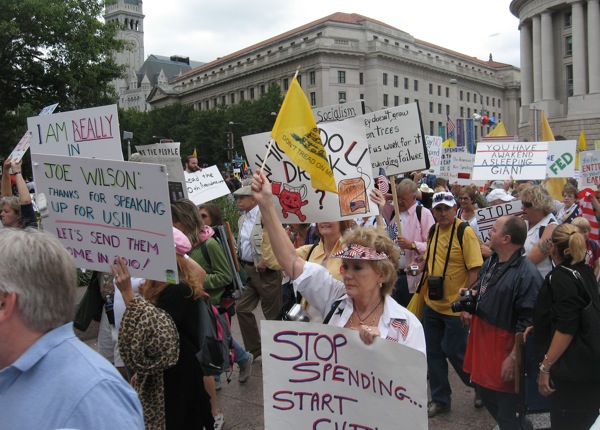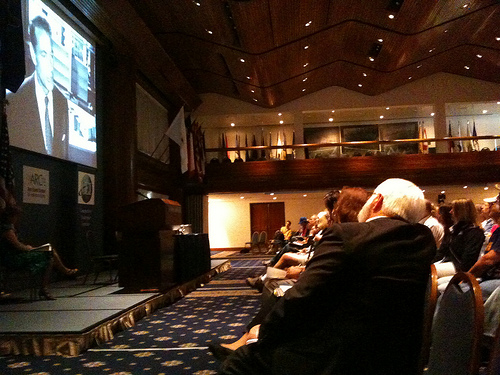Beltway Conservatives Comb Tea Party Movement for Converts
Even tea partiers have their limit.
Jul 31, 20201M Shares15.2M Views
Demonstrators march at Saturday's Tea Party rally. (Photo by Aaron Wiener)
After four hours of listening to libertarians, Stephanie Chrise decided to get up and get argumentative. The Texas orthodontist, in town one day early for Saturday’s massive “taxpayer march on Washington,” had just heard Yaron Brooks, the executive director of the Ayn Rand Institute, give a stemwinder of a speech based on the late objectivist philosopher and novelist’s work. Politicians from both parties, said Brooks, were looters who were stealing from Americans. Mike Huckabee was “more leftist than some of the Democrats.” Too many people had voted for the Democrats to redistribute wealth because they believed that “morality came from helping out this person who’s in distress.” To Chrise, it all sounded too selfish.
Image by: Matt Mahurin
“I’m a Christian,” said Chrise, standing at one of the microphones set up for audience questions, wearing a glittering red baseball cap and a commemorative T-shirt from the April 15 San Antonio Tea Party — the rally where Glenn Beck recorded a live broadcast of his Fox News show. “I believe that we were given unalienable rights based on our God-given rights.” She struggled, but got to her argument. “Once we earn money, we should help people.”
There were annoyed and angry shouts of “No!” from the crowd of around 300 Tea Party activists. There was also some applause. The people who’d come to this “Intellectual Ammunition Strategy Session” at the National Press Club, sponsored by the Ayn Rand Institute and the Competitive Enterprise Institute, a more political, libertarian think tank, were sympathetic to what Brooks was saying. But some of them were skeptical, too, and applauded Chrise.
“There are things we can do for people that are altruistic,” said Chrise, “that are not socialist.”
Brooks didn’t flinch, and tried to give Chrise an objectivist way out — as long as giving to charity made her happy, she could do it. But for no other reason. “Our sense of morality needs to come out of our own lives,” he said. “It’s your life, in my view, that needs to become the focus of your life.”
Chrise leaned back into the microphone. “That’s exactly what Satan said.” As Brooks continued, Chrise made her way out of the room, stopping occasionally to shake hands, but hurrying as other participants shushed her.
By the standards of Q&As at political speeches, and certainly by the standards set during the town hall meetings that scored members of Congress this summer, Chrise’s dissent was mild stuff. It was, however, a revealing snapshot of the people who trekked to Washington to participate in the weekend’s historic protests. (In the run-up to the big day, FreedomWorks told reportersthat 30,000 people would show up at the west lawn of the Capitol. Privately, some in the conservative group hoped and thought that the number would hit 100,000. The likely attendance number, around 60,000 to 70,000, would still make it the largest conservative protest ever to storm the Capitol.)
The arrival of the Tea Party movement has been a godsend for libertarian and conservative organizations, as they’ve offered their services to help organizers and upped their media bookings to talk about the small government grassroots that sprung, seemingly, from nowhere. In April, Matt Kibbe of FreedomWorks arguedthat Tea Party protesters “represent a potentially potent new constituency for fiscal discipline and government restraint.” Sales of Ayn Rand’s books have surged this year, and organizers speak with pride about how members of the movement know more about bills in Congress than congressmen or senators. But as the movement arrived in Washington, some seams between the social conservative and economic-minded wings began to show.
A Tea Party crowd watches a clip from "The Fountainhead," the film adaptation of Ayn Rand's novel, on Friday. (Photo by David Weigel)
The past week’s meeting of the new conservative grassroots and the jacket-and-tie organizations had its awkward moments. According to FreedomWorks spokesman Adam Brandon, speakers at the march on Washington were not censored, and vetted only to make sure they’d stick to the message of the day. That freedom occasionally allowed the more extreme aspects of the movement break through to. Hi-Caliber, a rapper who occasionally appearson Monica Crowley’s radio show, roused the audience with a new, event-specific rap, and drew some of his loudest cheers when he indulged the conspiracy that President Obama was born outside the United States.
I don’t need another lecture from this socialist hypocrite
You say it’s your birthday
But where’s your birth certificate?
James Andura, the owner of a Chrysler Dealership in New York, told the crowd that his business had been “stolen” by the government in a speech that delved deeper and deeper into fear that Americans were losing their freedom to a fascist takeover. “If we the people don’t stop this insane march toward socialism and tyranny,” said Andura, “we might see a situation just like in many countries through history, where a set of circumstances put in a person or a regime that believes in totalitarianism.”
One day earlier, inside the “Intellectual Ammunition” session, full-time conservative and libertarian activists found themselves packaging their philosophy for people from middle America who were more likely to have been roused to action by Glenn Beck than by the Austrian economists. A steady stream of activists came into the National Press Club’s ballroom–the building’s biggest, the site of marquee speeches by celebrities, governors, and members of Congress — and grabbed free Ayn Rand Samplers, with excerpts of her novels and nonfiction, between taking photos of one another’s T-shirts and talking about how they heard about the march, how far they’d traveled to get there, and how thrilling it was to meet like-minded peope.
“We hit a 6-point buck and totaled our truck,” said Karen Bogart, an activist from Casper, Wy. who sported a “9-12 Project” hat from her association with Glenn Beck’s conservative grassroots organizations. “We put out a message to the other 9-12ers and they let us use their cars when we needed them. That’s just how 9-12ers are.”
Lin Zinser, the Ayn Rand Institute’s vice president for outreach, welcomed the event’s attendees by crediting them with the start of a Boston Tea Party-style revolution. They were, she said, “the heart, the soul, and the mind of America.”
“This president and this Congress,” said Zinser, “are ignoring the hard-working, producing, and self-sufficient Americans that you all represent.”
“You are not lying!” yelled a friendly heckler. The room broke up with laughter.
“How many of you think the president and Congress are ignoring your phone calls and e-mails?” asked Zinser.
“They are lying!” yelled another member of the crowd. Later, Zinser would spot a Glenn Beck T-shirt on one activist and thank her and the “Glenn Beckies” for building up the movement.
From there, four lecturers gave the captivated crowd lessons in the history of protest movements, in the Constitution, and in libertarian philosophy. (An audience that filled most of the room dwindled after a short lunch break, but remained above 100.) Iain Murray, a scholar at the Competitive Enterprise Institute, gave the audience a short history of English citizen revolts like the Pilgrimage of Grace and the Glorious Revolution. He pointed to the demands of the 1381 Peasants’ Revolt — “there should be no law within the realm save the law of Winchester” to argue that “the right of people to keep and bear arms was only right that people wanted in 1381.” The far-flung activists murmured in agreement; during the Q&A, one told Murray that he interpreted the Second Amendment in a way that gave Americans the right to take up arms against the government.
Fred Smith, the president of the energy and food industry-funded Competitive Enterprise Institute, gave the audience a more pop culture and philosophy-centric presentation. He was introduced by a clip from the film “Other People’s Money” in which Danny DeVito, playing a liquidator telling stockholders to dump their failing business instead of hoping for someone to come in and save it. And he ended it by ripping off his white dress shirt to reveal a bright red “Capitalism” T-shirtdesigned by Bureaucrash, a libertarian protest group that began as a student organization at Hillsdale and has evolved into a new media-driven activist arm of CEI. In between, he attempted to prove to the activists that their suspicion that the environmental movement was anti-human and anti-progress was absolutely right.
“Death, poverty, and ignorance,” said Smith. “That is their mantra for the world they want to live in! And they get popular support!”
No one got a truly divided response from the crowd until Brooks, a pugnacious speaker who recited Rand’s extreme pro-capitalism dogma in a syrupy Israeli accent. He found some converts. Don Ballantine, a California activist who’d told TWI on Thursday that the Tea Party movement talked too much about issues and too little about freedom, said Brooks had hit the mark. One activist told Brooks he sounded like “the new Patrick Henry.” But before Crise’s walkout, there was some dissent.
“I need help,” asked one questioner, “in the argument of why it’s OK for CEOs to make ‘X’ amount of dollars in this crisis that just happened when they were taking peoples’ money and not paying attention.”
“Where are the perp walks?” shouted another voice in the crowd.
Brooks, undeterred, defended the right of corporate executives to make whatever they want. “Why is it any business what CEOs make?” he scolded. “You’ve got to get away from this zero-sum world of the left.”
Outside, she chatted with Mike Walsh, a software designer from New Hampshire, and Randy Alexander, a housing director at the University of Arkansas. The conversation got loud enough for an annoyed fan of Brooks to shut the press club ballroom’s door behind them.
“I thought a lot of what he said was good,” said Alexander, “but when he was done I said: There’s something about this that really bothers me. What we should be for is freedom to make up your own mind.”
“You want to be able to give through your church to your community,” said Walsh.
“His message, to me,” said Alexander, “was hollow, pointless and sad.”
“And he was on Glenn Beck,” said Crise, shaking her head. “That’s where I first saw him.”
–

Paolo Reyna
Reviewer
Paolo Reyna is a writer and storyteller with a wide range of interests. He graduated from New York University with a Bachelor of Arts in Journalism and Media Studies.
Paolo enjoys writing about celebrity culture, gaming, visual arts, and events. He has a keen eye for trends in popular culture and an enthusiasm for exploring new ideas. Paolo's writing aims to inform and entertain while providing fresh perspectives on the topics that interest him most.
In his free time, he loves to travel, watch films, read books, and socialize with friends.
Latest Articles
Popular Articles


